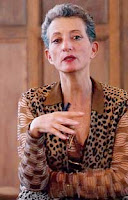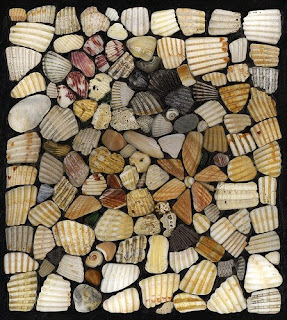
since feeling is first
who pays any attention
to the syntax of things
will never wholly kiss you;
wholly to be a fool
while Spring is in the world
my blood approves,
and kisses are a better fate
than wisdom
lady i swear by all flowers. Don't cry
—the best gesture of my brain is less than
your eyelids' flutter which says
we are for each other:then
laugh, leaning back in my arms
for life's not a paragraph
And death i think is no parenthesis
-e. e. cummings
I've been reading the book The Message in the Bottle: How Queer Man is, How Queer Language is, and What One Has to do with the Other by Walker Percy, and
 it has me thinking a lot about the way that we understand the phenomenon of language. Percy discusses the fact that although we see everything through our use of language, it is so much a part of us that we have no real understanding of language itself. We don't understand what we actually do when we refer to an object with a word and someone else understands it. To try to understand how an understanding of language develops within a person, Percy looks at the case of Helen Keller and the instance when she first learned the symbol for water. Most people learn to use language when they're too young to remember it happening, but Keller has the unique experience of being able to recount her first experience with understanding language. Keller describes, "Suddenly I felt a misty consciousness as of something forgotten--a thrill returning to me. I knew then that 'w-a-t-e-r' meant the wonderful cool something that was flowing over my hand. That living word awakened my soul, gave it light, hope, joy, set if free!" (35). Percy attempts to examine what happened at the instant when a new relationship developed between Helen, the word water, and the liquid she felt. He argues that the new relationship developed between the three things in that "ah ha!" moment changes the nature of all three of them. He also claims that this must have been the type of experience that occurred at people's first use of language: "Helen's breakthrough must bear some relation to the breakthrough of the species itself" (38).
it has me thinking a lot about the way that we understand the phenomenon of language. Percy discusses the fact that although we see everything through our use of language, it is so much a part of us that we have no real understanding of language itself. We don't understand what we actually do when we refer to an object with a word and someone else understands it. To try to understand how an understanding of language develops within a person, Percy looks at the case of Helen Keller and the instance when she first learned the symbol for water. Most people learn to use language when they're too young to remember it happening, but Keller has the unique experience of being able to recount her first experience with understanding language. Keller describes, "Suddenly I felt a misty consciousness as of something forgotten--a thrill returning to me. I knew then that 'w-a-t-e-r' meant the wonderful cool something that was flowing over my hand. That living word awakened my soul, gave it light, hope, joy, set if free!" (35). Percy attempts to examine what happened at the instant when a new relationship developed between Helen, the word water, and the liquid she felt. He argues that the new relationship developed between the three things in that "ah ha!" moment changes the nature of all three of them. He also claims that this must have been the type of experience that occurred at people's first use of language: "Helen's breakthrough must bear some relation to the breakthrough of the species itself" (38).I've thought a lot about this view of language in my philosophy class, and something I read in Augustine's The Trinity seemed to provide me with an element that was missing from Percy's view of language. Augustine creates a beautiful analogy between the way that our word functions and the way that Christ functions:
"Hence, the word which sounds without is a sign of the word that shines within, to which the name of word more properly belongs. For that which is produced by the mouth of the flesh is the sound of the word, and is itself also called the word, because that inner word assumed it in order that it might appear outwardly. For just as our word in some way becomes a bodily sound by assuming that in which it may be manifested to the senses of men, so the Word of God was made flesh by assuming that in which He might also be manifested to the senses of men. And just as our word becomes a sound that is not changed into a sound, so the Word of God indeed becomes flesh, but far be it that it should be changed into flesh. For by assuming it, not by being consumed in it, this word of ours becomes a sound, and that Word becomes flesh." (19)While Augustine's analogy doesn't fulfill Percy's task of understanding the phenomenon of language, it seems impossible to actually understand language in the way that Percy wants to and aspires for. Percy's ideas are extremely interesting to think about, but Augustine's analogy is good enough for me.














